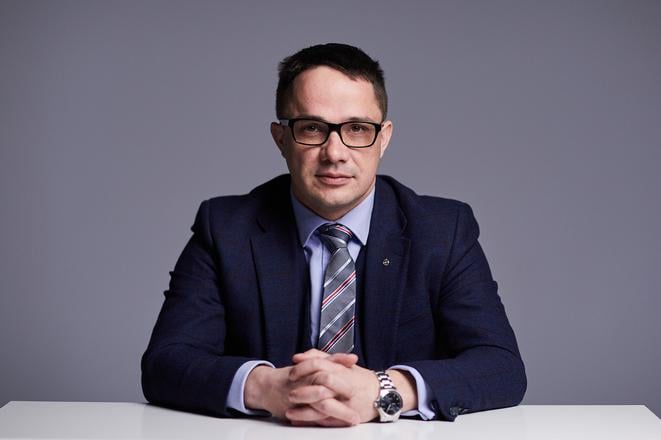Lawyer and tax expert Peter Slávik began specialising in tax law during his university studies. He started in tax consultancy but, realising its growing importance in transforming economies such as Slovakia’s, he re-focused to specialise in tax controversy – disputes between taxpayers and tax authorities over tax liabilities, compliance issues, and the interpretation of tax laws and regulations.
A single case – that of tax fraudster Ladislav Bašternák – has led to a surge in interest in the services of his law firm, TaxLaw.
Bašternák was found guilty of tax fraud and ordered to pay back almost €2 million he owed to the tax authorities. He was also jailed for five years.
“People realised that being caught red-handed after mismanaging taxes – either intentionally or not – isn’t just about repaying what’s owed. It carries criminal consequences,” says Slávik. “The state’s penal policy automatically comes into effect, potentially leading to prison time.”
The Slovak Spectator spoke with Slávik, founder and CEO of TaxLaw, which specialises in the field of tax controversy, about tax inspections, how experts can help companies to navigate them, and the complexity of the current tax system in Slovakia.
How are tax inspections approached in Slovakia?
A tax inspection follows the classic university textbook definition of inspections: if an inspection doesn’t find an issue, it was done poorly. This is exactly how tax inspectors approach them – as a rule, in almost 98 percent of inspections, they always find some fault. Whether this is good or bad, I don’t know, but the approach is generally negative, as inspectors seem determined to uncover as many shortcomings as possible. Often, they go into an inspection intending to confirm some kind of mismanagement, disregarding the arguments of the accused party. As a result, in the vast majority of cases, we are only able to disprove their arguments in court.
This can be devastating for an entrepreneur, because it usually takes three to four years at best from the moment a tax inspection begins until a court judgment is issued. Throughout this entire period, their accounts and assets remain frozen if there is a suspicion of tax evasion. This may, especially in the case of small businesses, hinder their operations, despite the fact that in the end a court may rule they did not evade any tax.
Another issue is that a tax inspection for the same matter in Prievidza could result in a completely different finding to an inspection for the same thing in, say, Žilina. When we confront tax inspectors with this inconsistency, they are completely indifferent to it. They rely on making life so unpleasant for a businessperson that the businessperson eventually gives in. Sometimes business owners admit to mistakes they didn’t actually make, in order just to be left alone – even if it means accepting penalties that they know are unjust.

In such cases, are there consequences for these entrepreneurs?
Of course. The problem is that if an entrepreneur accepts the findings of the tax inspectors, even if they disagree, they are effectively signing an admission statement. Often, the matter is then directly forwarded to law enforcement authorities. That is where the danger lies – by admitting to having committed a crime, they could even be given a prison sentence. But once an entrepreneur admits guilt, even if they didn’t commit any tax fraud, our hands are pretty much tied.
When is the best time for a client to contact you?
Don’t come to us after you have already received a decision from the tax office. We can still help at that stage, but it’s not as effective. Ideally, clients should reach out to us as soon as they receive either formal or informal information that a tax inspection is coming. At that point, we take over representation and guide them through the entire process – from the tax inspection itself, through the assessment proceedings, the appeals process, and even court, if necessary.
Many people don’t realize that a tax inspection is a legal process – highly structured and formalised. Neither a tax advisor nor – certainly not – an accountant is fully equipped to navigate it and submit proper arguments. For example, they often tend to bring all the documents they have to the tax office. However, the correct procedure is for tax inspectors to request exactly what they need. They cannot, for instance, inspect VAT for April 2024 and then demand documents for the entire year. There are many other formal rules that need to be adhered to in the whole process.
Are there any interesting cases your company has been involved in?
Major problems often arise with electronic services, cloud solutions, and other high-tech supplies because tax inspectors do not have the expertise to grasp their complexity.
For example, there was a case where we needed to explain a particular banking security solution, but the tax inspectors couldn’t comprehend it. They said they needed an expert to explain it to them. So, we brought in an IT security specialist directly from the company. However, the solution was so technically complex that the tax inspectors simply could not understand it at all. And the outcome reflected that – they assessed [there being a need for] additional tax [payments to be made] because they simply didn’t believe our arguments. We could argue all we wanted, but it wasn’t going to help. In such cases, at that point the only option left is to take the case to court.
Have you ever come across a case where a tax inspection was misused as a tool for revenge?
Currently, we are involved in about 1,100 active inspections, and I would guess that dozens of them are acts of revenge or are driven by business rivalry. However, I cannot confirm this because anyone can make a request for a tax inspection to be carried out, but you never find out who submitted the request.
How do tax offices decide who to inspect?
I can’t say for sure, and I’m not even sure if there’s any specific formula for it. Maybe there are some indications – for example, if a company has an annual turnover of €100,000 and suddenly it jumps to €300,000 in just one month, that’s a sign of something.
Frequent inspections also happen when a company is part of a fraudulent chain. That means if a supplier or subcontractor is inspected and some irregularities or even fraud are discovered, they go on to check the entire chain. Often, the person or company being inspected doesn’t even know they are part of such a chain.
Also, the recent linking of the land registry with the tax office revealed that many individuals and legal entities buying and selling real estate somehow “forgot” to report these transactions for taxation or to include them in their accounting.
Driving schools have also been quite “popular” this past year. There are suspicions that some take more money from students than they declare in their tax returns.
How do you see our tax system?
As unnecessarily complicated. When I started in the Big Four [accounting firms, i.e. Deloitte, EY, KPMG and PwC] right after university – that was back in 2008 – we had a flat tax in Slovakia of 19 percent, both for VAT and income tax for private as well as legal entities. Back then, calculating taxes was so simple that, jokingly, I asked my boss if we were going to go out of business.
Today, just for VAT there are three different rates. Recently, I was at a restaurant with colleagues, and my wife asked me to bring her lunch. The final bill was endlessly long: one rate for food consumed in the restaurant, another for takeaway food, a different one for alcoholic beverages, and yet another for non-alcoholic drinks.
Not only is this impossible to keep track of, creating a grey area, but it’s also detrimental to the state. A business owner, either intentionally or unintentionally, might misclassify the VAT rate. On the other hand, the tax inspector needs to be highly knowledgeable to be able to make a correct verification. This leads to tax evasion and increases the cost of tax administration for both the entrepreneur and the state.
Maybe it would be better to have just one tax rate, even if it’s higher, rather than several lower ones because it just gets confusing.
Do you see any other problematic issues in current tax legislation?
I would highlight one change in the Penal Code that has been pushed through by the current ruling coalition: the threshold for assessing tax evasion as a criminal offence increased from €2,660 to €20,000, and the statute of limitations was shortened as well. This change has helped protégés of the current ruling parties, but has also led to lower tax revenues.
Even we have clients whose potential tax offences have, though this, become statute-barred. However, about three months ago, the general prosecutor began, using paragraph 363 of the Penal Code, to reverse previous court rulings favourable to some of our clients, and tried to force them to pay extra tax.


 Peter Slávik (source: TaxLaw)
Peter Slávik (source: TaxLaw)